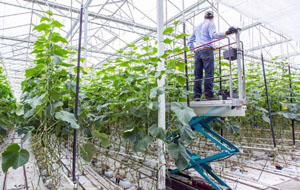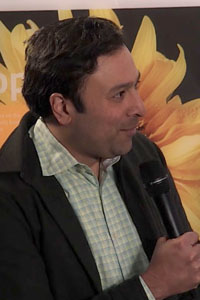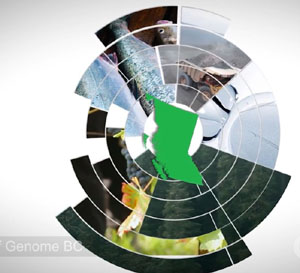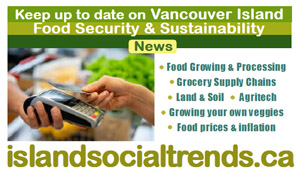Wednesday March 29, 2023 | LANGFORD, BC [Updated 9 am March 30, 2023]
by Mary P Brooke, B.Sc., Cert PR | Island Social Trends | IST Food Security Archive
“This is a whole new direction in agriculture that has very little to do with soil, traditional #ecosystems (natural, ecological, economic), or connection to the land. Immigrant workers still needed, but younger generation is gravitating toward corporate agritech.” ~ Mary P Brooke
A somewhat cohesive group of invited speakers explored various aspects of food sustainability in BC, at an online presentation March 28.
Four of the six speakers were talking big business scope for food production, processing and distribution from an industrial and fiscal profit perspective. The other two speakers were more reflective of the larger socioeconomic, cultural and political aspects of feeding a growing population both locally in BC as well as across Canada and in areas around the world.
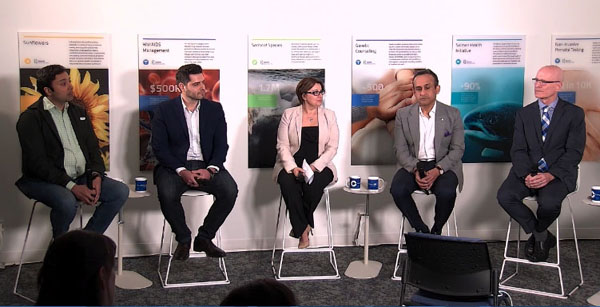
In-studio with moderator Stuart McNish in Vancouver were Karn Manhas, CEO of Terramera; Bahran Rashti, CEO, UP Vertical Farms & Fresh Green Farms; Frederica Di Palma, Chief Scientific Officer & VP Research and Innovation, Genome BC; Peter Dhillon, Chair of Ocean Spray and BC Food Security Task Force member; and Royal Roads University President Dr Philip Steenkamp. Participating remotely was Evan Fraser, Director of Arrell Food Institute and Professor at the University of Guelph.
Through the evening it was obvious that these speakers from business, non-profit and academia were aware of the impact of government policy and leadership around food sustainability. None of the invited guests were elected officials, though Dhillon has participated on the provincial food security task force.
Sponsors from big-scope business & agencies:

The sponsors were amply on display throughout the 1.5-hour seminar, clearly showing the big-business corporate industrial tack of the evening: Beedie/Built for Good, Research Co, LandlordBC, FortisBC, Polygon, Port of Vancouver, StemCell Technology; as well as supporters: Surrey Board of Trade and Canadian Beef. The event was presented in partnership with The Vancouver Sun.
Genome BC was thanked first and foremost for making the evening possible.
This was likely just as much about signalling the big-business aspect of new directions in agriculture to the investment sector (and perhaps the travel expenses for the speakers) as it was the actual cost to present an online web session (which can be done on a streamlined budget if one tries).
Ramping up to the new food tech:
Notably, much of what was talked about has been in the works for a while. Rashti talked about how his company developed their own in-house infrastructure and took their time with product development. Dhillon said his discussions about food sustainability with the BC Government went back to 2018 with the former premier.
As if breaking a glass ceiling, or perhaps more of a glass wall that lies ahead, the discussion took listeners into a near future of indoor world of agritech including vertical food growing without soil and with recapture of water and carbon dioxide. The near future of agriculture also requires a reorientation to embracing both local and global at the same time, as articulated by Dr Steenkamp and heard in other comments about growing and producing locally (to shorten the product distribution distance) as well as having product available for export.
The limited amount of arable land on the planet, including in BC despite the Agriculture Land Reserve (ALR) efforts, demands attention to proper soil management (notably with attention to fertilizer and soil nutrient balance). Canada is a strong producer of fertilizer (potash) in particular from the prairie provinces, as are both Russia and Ukraine; shipping becomes an important consideration in that regard.
Meanwhile, Rashti boasted that his indoor vertical agritech requires no soil at all. And that completely contained in-house food production (which in his case for now is almost exclusively small leafy greens) eliminates the reliance on just-in-time delivery and production which became all the rage in the 1970s to 1990s when things could be shipped anywhere without delay.
Reliance on foreign workers, for now:
Reliance on foreign workers for in-field farming is still a reality. The panelists noted that skilled immigrants are still needed in the food production sector.
Young Canadians are simply not showing much interest in adopting ‘back to the land’ farming for any sort of career direction, though some are becoming keen about the ‘labcoat’ style high tech farming of the near future. “Young people are redefining farming,” it was stated by one of the panelists, definitively.
Work at all scales:
“You need to work at all scales on this,” said Dr Steenkamp, seeming to counterbalance the big-business approach of the evening. He defended the modest size of the Royal Roads University ‘giving garden’ that started with 1,000 lb of food production in 2022 (a summer that got off to a cool start) but which is already ramping up to a goal of 250 lb per week and expanding from there. Apart from a hired garden project manager, most of the rest of the work is done by volunteers. “You need to give people the idea that they can make a contribution,” said Steenkamp, who himself did a bit of gardenwork last year there on campus.
Local vs global:
But the overall evening kept in mind the confluence of the challenges of supply chains, climate change and addressing local needs. Food is being moved to places (requiring supply chains) but it was proposed that the technology be the export product from Canada, rather than the food itself, so that people can grow locally in many areas around the world without having to entirely rely on shipping by air, boat, rail or truck.
Manhas said there is a lack of modern infrastructure in agriculture in BC. This is where change will need to happen.
Food prices:
Manhas also steered the conversation back on course after the moderator said people ‘will just have to get used to higher food prices’ (music to the ears of any potential big-tech investors). But like anything that goes through transition, competition will prevail as things get scaled up.
As more food is produced locally through more streamlined agritech processes, the overall cost of grocery shopping may yet come down. Though that’s a few years away, given the impacts of supply chain disruptions and incredibly hard-and-fast inflation that has yet to work its way through the economy.
Drop the 20th century assumptions:

Chiming in remotely, Fraser said that the new agriculture will include moving beyond 20th century assumptions (of the past 50 to 70 years) that:
- weather remains stable and the environment fertile;
- energy costs are low;
- every year gets a little easier to trade things across borders.
The 21st century approach is high-tech, vertical, and soil enhancement/regenerative that “breaks supply chains and makes them much smaller”.
Genetic modification:
It might be debatable, but the moderator declared that “we cannot do what we want to do if we do not incorporate advances in genetic science.” Di Palma with Genome BC defended the idea of being specific with what portion of genetic material or markers is responsible for improving a particular trait… in a very controlled way (to be resistant to various environmental factors as well as pests).
“We are not recreating anything. We are making very small controlled changes,” she said. She said “clearly we didn’t get it right” (during the pandemic, if not over the years) with regard to communicating the benefits of GMO to the public.
“The plants, the soil, the seeds, everything have the best opportunity to mature (food) and make it to market,” moderator McNish said, regarding providing the best opportunity to produce food.
But Manhas likened the genome and modification of food production to that of a hammer… it’s a tool, and it depends on how you use it as to the results you will achieve. He used the example of making the Arctic apple resistant for better growing in the BC climate. He mused as to whether it’s the genetic modification that upsets people versus what is done or achieved with it.
During the evening, Di Palma offered some hope with her comment that Genome BC is helping to establish that “there is value in the shift” to adopting new food production technologies.
BC Government sets a path:
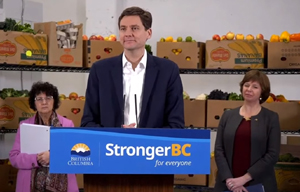
A few weeks ago BC Premier David Eby announced $200 million for developing initiatives in food sustainability, including an emphasis on food production (growing and processing in BC) as well as distribution (getting food — including rescue food from grocery stores, to the food banks and United Way).
Here is the outline about funding for the BC Food Security Initiatives (from the Budget 2023 documentation):
- Food security initiatives will support British Columbians to access an affordable supply of nutritious food.
- Through a series of targeted initiatives, strengthen the food supply chain across BC including local and regional food systems.
- Includes direct food support to underserved people and communities through trusted community partners such as Food Banks BC and the United Way.
- Dedicated funding to increase the availability of fresh food in Indigenous communities, increase food processing capacity in BC, and support the development of new and expanded local food production businesses.
- Improve the resilience of BC food supply by identifying and mitigating the effects of climate change and the increasing intensity of climate events.
Technological revolution in context:
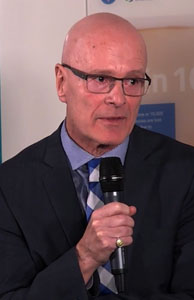
“We’ve seen technological revolutions before,” said Dr Steenkamp, pointing out that technology makes transformation possible. After hearing the full discussion, for his closing remarks Dr Steenkamp chose to urge that people carry forward in this industry with humility, as in recognizing the genius of food sustainability that has been practiced by Indigenous people for thousands of years. The Royal Roads University Indigenous food and medicine garden is getting underway this year.
Not only does Dr Steenkamp “absolutely think we can get there” (to an affordable, adequate supply of food) but Manhas further uplifted by saying “food will be affordable once again”. That’s as people “re-learn to live in a more sustainable way with less waste,” said Di Palma, though admitting food will cost more for a while yet.
===== RELATED ARTICLES by ISLAND SOCIAL TRENDS:
Island Social Trends Food Security Archive (ongoing)
What people are saying about food sustainability (Mar 29, 2023)
Harsh economic realities at the mercy of political leadership (Mar 23, 2023)
Food prices remain high, consumers hear more about grocery sector (Mar 11, 2023)
Premier Eby announces $200 million for BC food security initiatives (Mar 7, 2023)
Food garden at Belmont Secondary for learning and growing (Sept 22, 2022)
Growing your own food in inflationary times (July 3, 2022)
Food production garden gets growing at Royal Roads (Apr 13, 2022)
Island MP Alistair MacGregor introduces national soil health strategy bill (Apr 26, 2021)
==== ABOUT ISLAND SOCIAL TRENDS:
Island Social Trends is a long-standing publication in the west shore of South Vancouver Island (fourth in a series that began with MapleLine Magazine 2008-2010, Sooke Voice News 2011-2013, and West Shore Voice News 2014-2020, which then emerged as Island Social Trends in mid-2020).
Island Social Trends editor is Mary P Brooke, B.Sc. (Foods & Nutrition), Cert PR. She is a long-time journalist, delivering news through a socioeconomic lens.
Island Social Trends continues to build the Island Social Trends Food Security Archive with articles about current developments around food sustainability in BC.
IslandSocialTrends.ca covers news of the Greater Victoria area and south Vancouver Island, with insights on BC and national issues.
Ms Brooke has consistently covered progressive politics on Vancouver Island including a focus on food security for the South Vancouver Island region. She has presented detailed coverage of the SD62 School Board and its committees since 2014.


